Leadership and Management in Workplace - Desklib
VerifiedAdded on 2023/06/08
|10
|2552
|347
AI Summary
This report discusses the role of leaders and managers, their theories, and approaches. It also compares leadership and management styles in different organizations and evaluates their effectiveness. The impact of leadership and management on organizational culture and performance is also examined. The report is relevant to Higher National Diploma in Business Management, Unit 4 Leadership and Management.
Contribute Materials
Your contribution can guide someone’s learning journey. Share your
documents today.
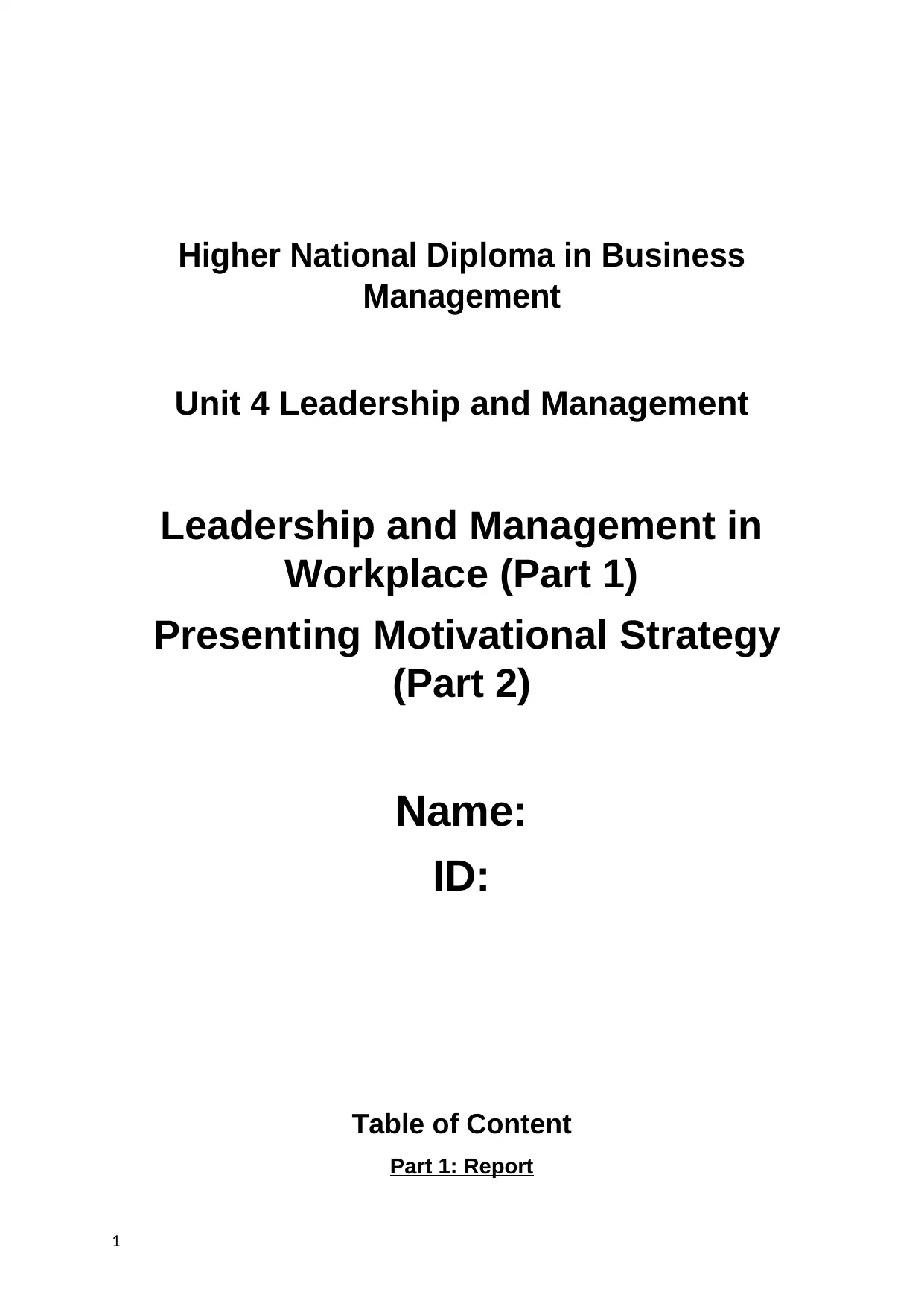
Higher National Diploma in Business
Management
Unit 4 Leadership and Management
Leadership and Management in
Workplace (Part 1)
Presenting Motivational Strategy
(Part 2)
Name:
ID:
Table of Content
Part 1: Report
1
Management
Unit 4 Leadership and Management
Leadership and Management in
Workplace (Part 1)
Presenting Motivational Strategy
(Part 2)
Name:
ID:
Table of Content
Part 1: Report
1
Secure Best Marks with AI Grader
Need help grading? Try our AI Grader for instant feedback on your assignments.
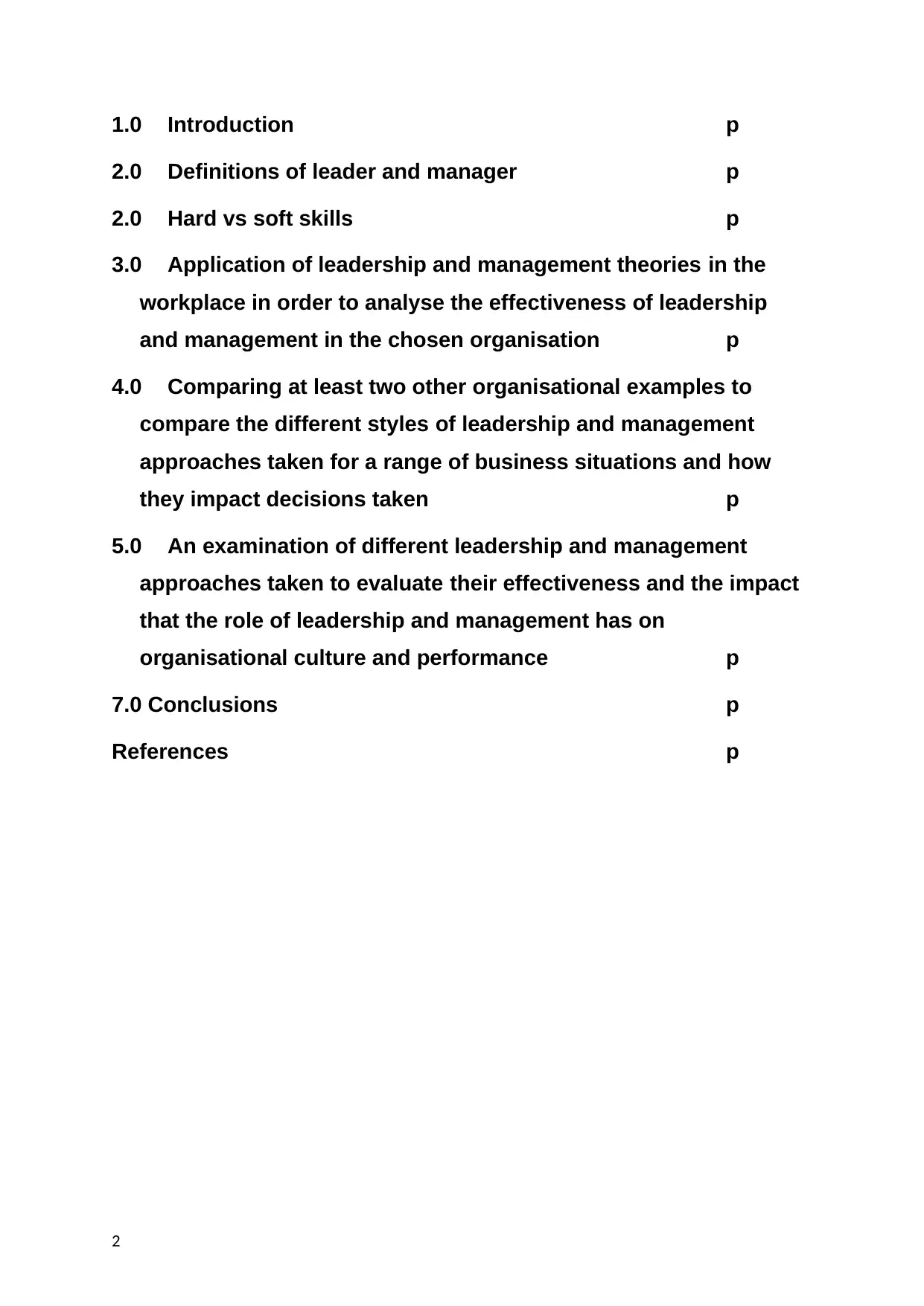
1.0 Introduction p
2.0 Definitions of leader and manager p
2.0 Hard vs soft skills p
3.0 Application of leadership and management theories in the
workplace in order to analyse the effectiveness of leadership
and management in the chosen organisation p
4.0 Comparing at least two other organisational examples to
compare the different styles of leadership and management
approaches taken for a range of business situations and how
they impact decisions taken p
5.0 An examination of different leadership and management
approaches taken to evaluate their effectiveness and the impact
that the role of leadership and management has on
organisational culture and performance p
7.0 Conclusions p
References p
2
2.0 Definitions of leader and manager p
2.0 Hard vs soft skills p
3.0 Application of leadership and management theories in the
workplace in order to analyse the effectiveness of leadership
and management in the chosen organisation p
4.0 Comparing at least two other organisational examples to
compare the different styles of leadership and management
approaches taken for a range of business situations and how
they impact decisions taken p
5.0 An examination of different leadership and management
approaches taken to evaluate their effectiveness and the impact
that the role of leadership and management has on
organisational culture and performance p
7.0 Conclusions p
References p
2
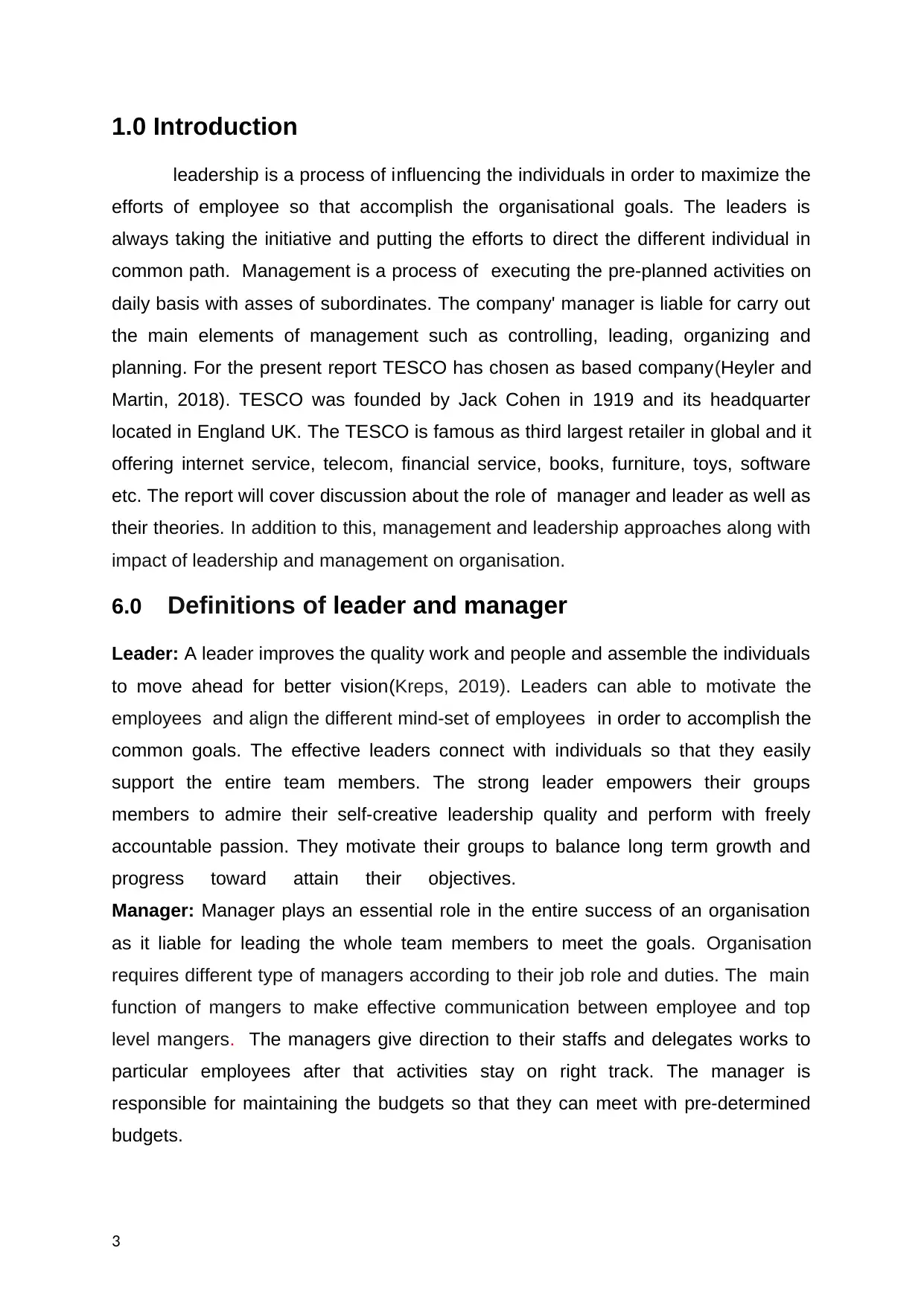
1.0 Introduction
leadership is a process of influencing the individuals in order to maximize the
efforts of employee so that accomplish the organisational goals. The leaders is
always taking the initiative and putting the efforts to direct the different individual in
common path. Management is a process of executing the pre-planned activities on
daily basis with asses of subordinates. The company' manager is liable for carry out
the main elements of management such as controlling, leading, organizing and
planning. For the present report TESCO has chosen as based company(Heyler and
Martin, 2018). TESCO was founded by Jack Cohen in 1919 and its headquarter
located in England UK. The TESCO is famous as third largest retailer in global and it
offering internet service, telecom, financial service, books, furniture, toys, software
etc. The report will cover discussion about the role of manager and leader as well as
their theories. In addition to this, management and leadership approaches along with
impact of leadership and management on organisation.
6.0 Definitions of leader and manager
Leader: A leader improves the quality work and people and assemble the individuals
to move ahead for better vision(Kreps, 2019). Leaders can able to motivate the
employees and align the different mind-set of employees in order to accomplish the
common goals. The effective leaders connect with individuals so that they easily
support the entire team members. The strong leader empowers their groups
members to admire their self-creative leadership quality and perform with freely
accountable passion. They motivate their groups to balance long term growth and
progress toward attain their objectives.
Manager: Manager plays an essential role in the entire success of an organisation
as it liable for leading the whole team members to meet the goals. Organisation
requires different type of managers according to their job role and duties. The main
function of mangers to make effective communication between employee and top
level mangers. The managers give direction to their staffs and delegates works to
particular employees after that activities stay on right track. The manager is
responsible for maintaining the budgets so that they can meet with pre-determined
budgets.
3
leadership is a process of influencing the individuals in order to maximize the
efforts of employee so that accomplish the organisational goals. The leaders is
always taking the initiative and putting the efforts to direct the different individual in
common path. Management is a process of executing the pre-planned activities on
daily basis with asses of subordinates. The company' manager is liable for carry out
the main elements of management such as controlling, leading, organizing and
planning. For the present report TESCO has chosen as based company(Heyler and
Martin, 2018). TESCO was founded by Jack Cohen in 1919 and its headquarter
located in England UK. The TESCO is famous as third largest retailer in global and it
offering internet service, telecom, financial service, books, furniture, toys, software
etc. The report will cover discussion about the role of manager and leader as well as
their theories. In addition to this, management and leadership approaches along with
impact of leadership and management on organisation.
6.0 Definitions of leader and manager
Leader: A leader improves the quality work and people and assemble the individuals
to move ahead for better vision(Kreps, 2019). Leaders can able to motivate the
employees and align the different mind-set of employees in order to accomplish the
common goals. The effective leaders connect with individuals so that they easily
support the entire team members. The strong leader empowers their groups
members to admire their self-creative leadership quality and perform with freely
accountable passion. They motivate their groups to balance long term growth and
progress toward attain their objectives.
Manager: Manager plays an essential role in the entire success of an organisation
as it liable for leading the whole team members to meet the goals. Organisation
requires different type of managers according to their job role and duties. The main
function of mangers to make effective communication between employee and top
level mangers. The managers give direction to their staffs and delegates works to
particular employees after that activities stay on right track. The manager is
responsible for maintaining the budgets so that they can meet with pre-determined
budgets.
3
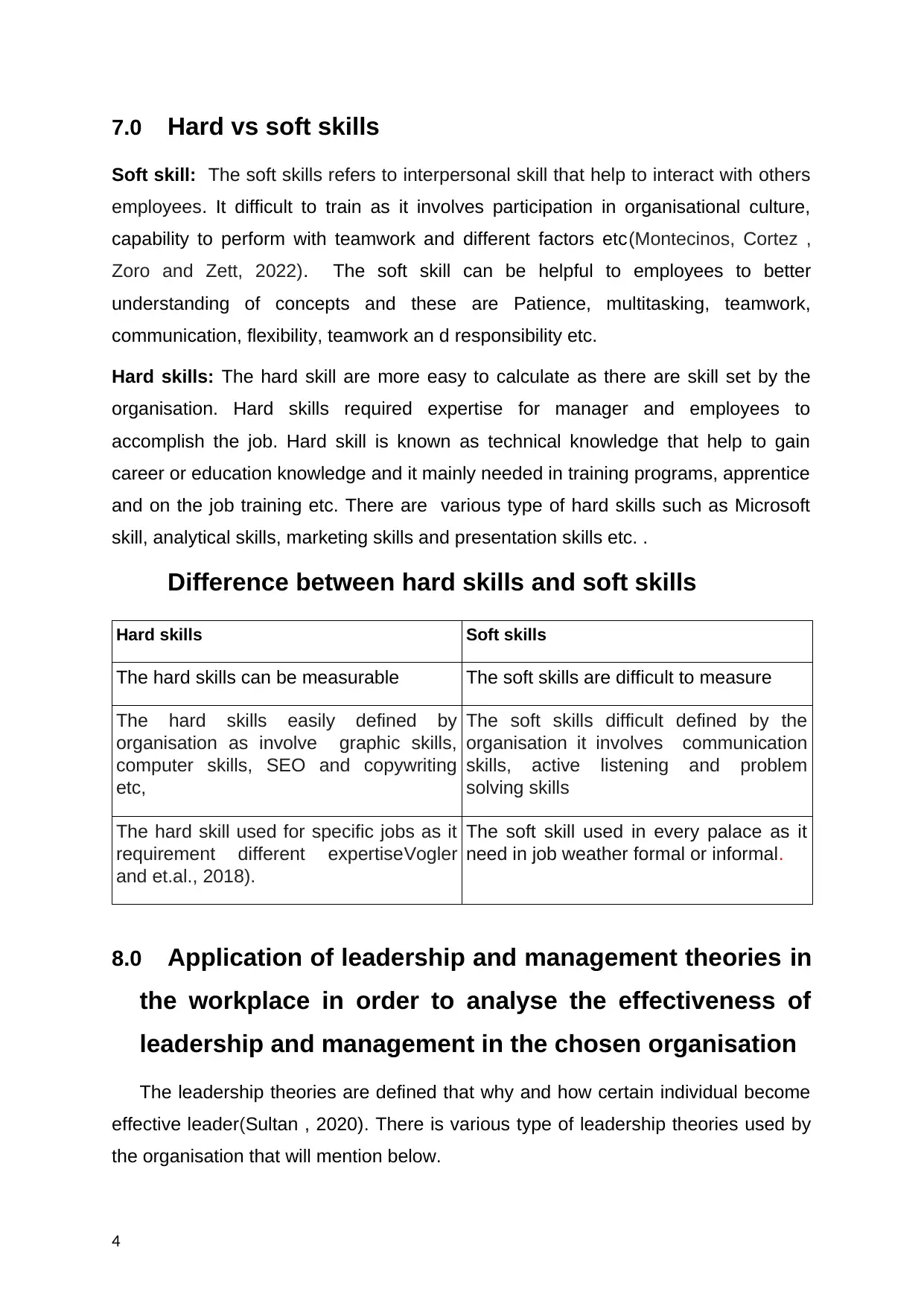
7.0 Hard vs soft skills
Soft skill: The soft skills refers to interpersonal skill that help to interact with others
employees. It difficult to train as it involves participation in organisational culture,
capability to perform with teamwork and different factors etc(Montecinos, Cortez ,
Zoro and Zett, 2022). The soft skill can be helpful to employees to better
understanding of concepts and these are Patience, multitasking, teamwork,
communication, flexibility, teamwork an d responsibility etc.
Hard skills: The hard skill are more easy to calculate as there are skill set by the
organisation. Hard skills required expertise for manager and employees to
accomplish the job. Hard skill is known as technical knowledge that help to gain
career or education knowledge and it mainly needed in training programs, apprentice
and on the job training etc. There are various type of hard skills such as Microsoft
skill, analytical skills, marketing skills and presentation skills etc. .
Difference between hard skills and soft skills
Hard skills Soft skills
The hard skills can be measurable The soft skills are difficult to measure
The hard skills easily defined by
organisation as involve graphic skills,
computer skills, SEO and copywriting
etc,
The soft skills difficult defined by the
organisation it involves communication
skills, active listening and problem
solving skills
The hard skill used for specific jobs as it
requirement different expertiseVogler
and et.al., 2018).
The soft skill used in every palace as it
need in job weather formal or informal.
8.0 Application of leadership and management theories in
the workplace in order to analyse the effectiveness of
leadership and management in the chosen organisation
The leadership theories are defined that why and how certain individual become
effective leader(Sultan , 2020). There is various type of leadership theories used by
the organisation that will mention below.
4
Soft skill: The soft skills refers to interpersonal skill that help to interact with others
employees. It difficult to train as it involves participation in organisational culture,
capability to perform with teamwork and different factors etc(Montecinos, Cortez ,
Zoro and Zett, 2022). The soft skill can be helpful to employees to better
understanding of concepts and these are Patience, multitasking, teamwork,
communication, flexibility, teamwork an d responsibility etc.
Hard skills: The hard skill are more easy to calculate as there are skill set by the
organisation. Hard skills required expertise for manager and employees to
accomplish the job. Hard skill is known as technical knowledge that help to gain
career or education knowledge and it mainly needed in training programs, apprentice
and on the job training etc. There are various type of hard skills such as Microsoft
skill, analytical skills, marketing skills and presentation skills etc. .
Difference between hard skills and soft skills
Hard skills Soft skills
The hard skills can be measurable The soft skills are difficult to measure
The hard skills easily defined by
organisation as involve graphic skills,
computer skills, SEO and copywriting
etc,
The soft skills difficult defined by the
organisation it involves communication
skills, active listening and problem
solving skills
The hard skill used for specific jobs as it
requirement different expertiseVogler
and et.al., 2018).
The soft skill used in every palace as it
need in job weather formal or informal.
8.0 Application of leadership and management theories in
the workplace in order to analyse the effectiveness of
leadership and management in the chosen organisation
The leadership theories are defined that why and how certain individual become
effective leader(Sultan , 2020). There is various type of leadership theories used by
the organisation that will mention below.
4
Secure Best Marks with AI Grader
Need help grading? Try our AI Grader for instant feedback on your assignments.
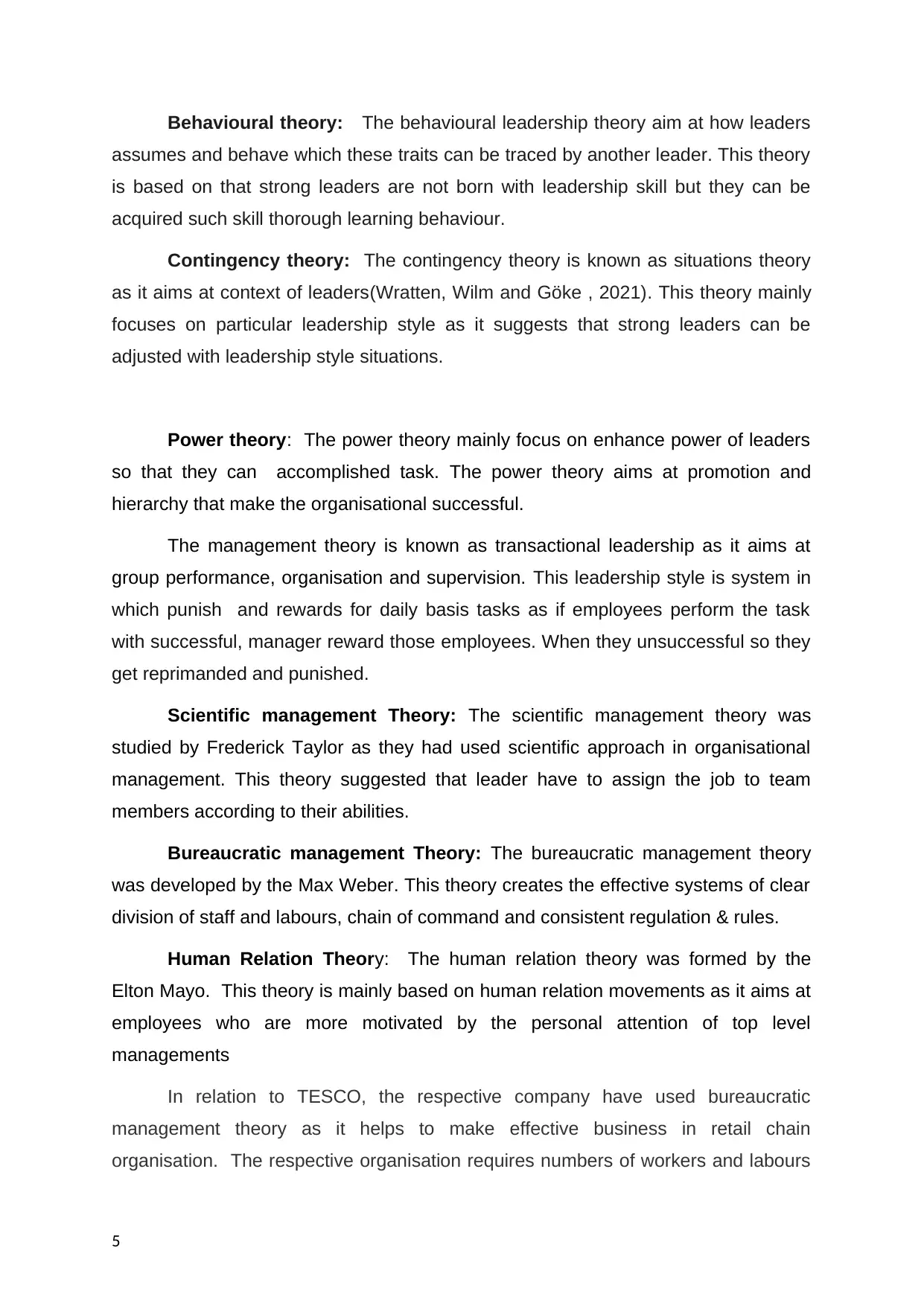
Behavioural theory: The behavioural leadership theory aim at how leaders
assumes and behave which these traits can be traced by another leader. This theory
is based on that strong leaders are not born with leadership skill but they can be
acquired such skill thorough learning behaviour.
Contingency theory: The contingency theory is known as situations theory
as it aims at context of leaders(Wratten, Wilm and Göke , 2021). This theory mainly
focuses on particular leadership style as it suggests that strong leaders can be
adjusted with leadership style situations.
Power theory: The power theory mainly focus on enhance power of leaders
so that they can accomplished task. The power theory aims at promotion and
hierarchy that make the organisational successful.
The management theory is known as transactional leadership as it aims at
group performance, organisation and supervision. This leadership style is system in
which punish and rewards for daily basis tasks as if employees perform the task
with successful, manager reward those employees. When they unsuccessful so they
get reprimanded and punished.
Scientific management Theory: The scientific management theory was
studied by Frederick Taylor as they had used scientific approach in organisational
management. This theory suggested that leader have to assign the job to team
members according to their abilities.
Bureaucratic management Theory: The bureaucratic management theory
was developed by the Max Weber. This theory creates the effective systems of clear
division of staff and labours, chain of command and consistent regulation & rules.
Human Relation Theory: The human relation theory was formed by the
Elton Mayo. This theory is mainly based on human relation movements as it aims at
employees who are more motivated by the personal attention of top level
managements
In relation to TESCO, the respective company have used bureaucratic
management theory as it helps to make effective business in retail chain
organisation. The respective organisation requires numbers of workers and labours
5
assumes and behave which these traits can be traced by another leader. This theory
is based on that strong leaders are not born with leadership skill but they can be
acquired such skill thorough learning behaviour.
Contingency theory: The contingency theory is known as situations theory
as it aims at context of leaders(Wratten, Wilm and Göke , 2021). This theory mainly
focuses on particular leadership style as it suggests that strong leaders can be
adjusted with leadership style situations.
Power theory: The power theory mainly focus on enhance power of leaders
so that they can accomplished task. The power theory aims at promotion and
hierarchy that make the organisational successful.
The management theory is known as transactional leadership as it aims at
group performance, organisation and supervision. This leadership style is system in
which punish and rewards for daily basis tasks as if employees perform the task
with successful, manager reward those employees. When they unsuccessful so they
get reprimanded and punished.
Scientific management Theory: The scientific management theory was
studied by Frederick Taylor as they had used scientific approach in organisational
management. This theory suggested that leader have to assign the job to team
members according to their abilities.
Bureaucratic management Theory: The bureaucratic management theory
was developed by the Max Weber. This theory creates the effective systems of clear
division of staff and labours, chain of command and consistent regulation & rules.
Human Relation Theory: The human relation theory was formed by the
Elton Mayo. This theory is mainly based on human relation movements as it aims at
employees who are more motivated by the personal attention of top level
managements
In relation to TESCO, the respective company have used bureaucratic
management theory as it helps to make effective business in retail chain
organisation. The respective organisation requires numbers of workers and labours
5
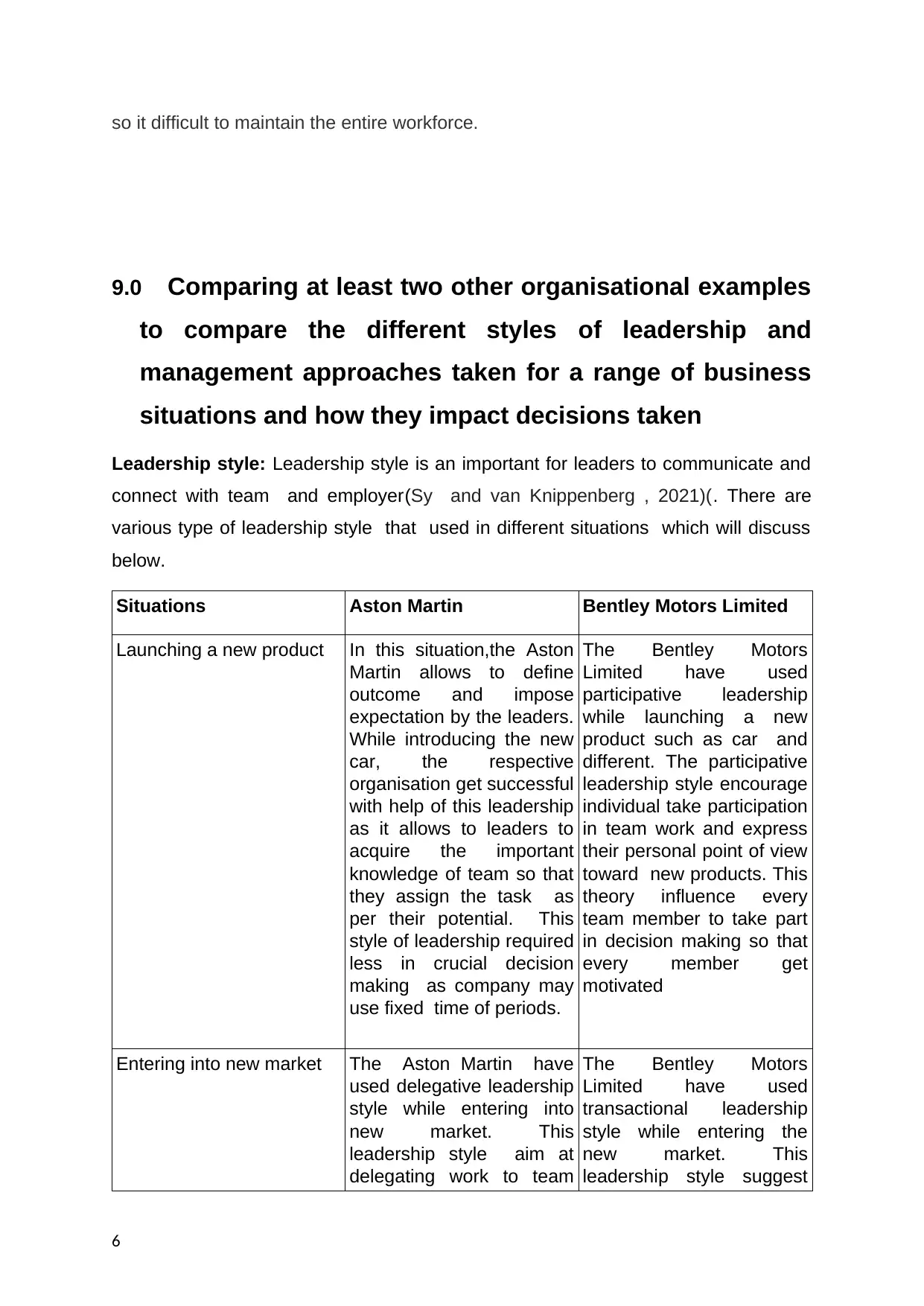
so it difficult to maintain the entire workforce.
9.0 Comparing at least two other organisational examples
to compare the different styles of leadership and
management approaches taken for a range of business
situations and how they impact decisions taken
Leadership style: Leadership style is an important for leaders to communicate and
connect with team and employer(Sy and van Knippenberg , 2021)(. There are
various type of leadership style that used in different situations which will discuss
below.
Situations Aston Martin Bentley Motors Limited
Launching a new product In this situation,the Aston
Martin allows to define
outcome and impose
expectation by the leaders.
While introducing the new
car, the respective
organisation get successful
with help of this leadership
as it allows to leaders to
acquire the important
knowledge of team so that
they assign the task as
per their potential. This
style of leadership required
less in crucial decision
making as company may
use fixed time of periods.
The Bentley Motors
Limited have used
participative leadership
while launching a new
product such as car and
different. The participative
leadership style encourage
individual take participation
in team work and express
their personal point of view
toward new products. This
theory influence every
team member to take part
in decision making so that
every member get
motivated
Entering into new market The Aston Martin have
used delegative leadership
style while entering into
new market. This
leadership style aim at
delegating work to team
The Bentley Motors
Limited have used
transactional leadership
style while entering the
new market. This
leadership style suggest
6
9.0 Comparing at least two other organisational examples
to compare the different styles of leadership and
management approaches taken for a range of business
situations and how they impact decisions taken
Leadership style: Leadership style is an important for leaders to communicate and
connect with team and employer(Sy and van Knippenberg , 2021)(. There are
various type of leadership style that used in different situations which will discuss
below.
Situations Aston Martin Bentley Motors Limited
Launching a new product In this situation,the Aston
Martin allows to define
outcome and impose
expectation by the leaders.
While introducing the new
car, the respective
organisation get successful
with help of this leadership
as it allows to leaders to
acquire the important
knowledge of team so that
they assign the task as
per their potential. This
style of leadership required
less in crucial decision
making as company may
use fixed time of periods.
The Bentley Motors
Limited have used
participative leadership
while launching a new
product such as car and
different. The participative
leadership style encourage
individual take participation
in team work and express
their personal point of view
toward new products. This
theory influence every
team member to take part
in decision making so that
every member get
motivated
Entering into new market The Aston Martin have
used delegative leadership
style while entering into
new market. This
leadership style aim at
delegating work to team
The Bentley Motors
Limited have used
transactional leadership
style while entering the
new market. This
leadership style suggest
6
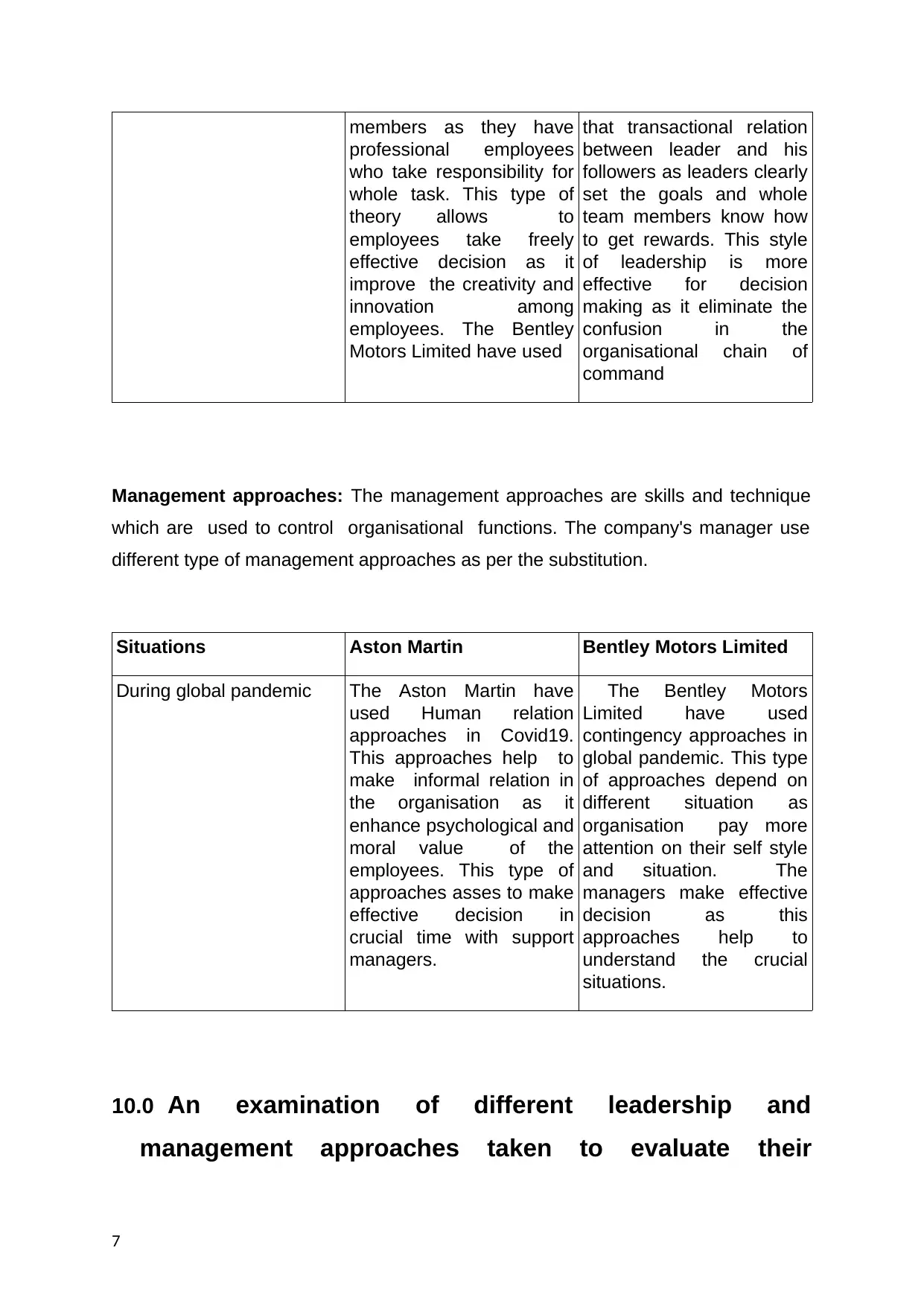
members as they have
professional employees
who take responsibility for
whole task. This type of
theory allows to
employees take freely
effective decision as it
improve the creativity and
innovation among
employees. The Bentley
Motors Limited have used
that transactional relation
between leader and his
followers as leaders clearly
set the goals and whole
team members know how
to get rewards. This style
of leadership is more
effective for decision
making as it eliminate the
confusion in the
organisational chain of
command
Management approaches: The management approaches are skills and technique
which are used to control organisational functions. The company's manager use
different type of management approaches as per the substitution.
Situations Aston Martin Bentley Motors Limited
During global pandemic The Aston Martin have
used Human relation
approaches in Covid19.
This approaches help to
make informal relation in
the organisation as it
enhance psychological and
moral value of the
employees. This type of
approaches asses to make
effective decision in
crucial time with support
managers.
The Bentley Motors
Limited have used
contingency approaches in
global pandemic. This type
of approaches depend on
different situation as
organisation pay more
attention on their self style
and situation. The
managers make effective
decision as this
approaches help to
understand the crucial
situations.
10.0 An examination of different leadership and
management approaches taken to evaluate their
7
professional employees
who take responsibility for
whole task. This type of
theory allows to
employees take freely
effective decision as it
improve the creativity and
innovation among
employees. The Bentley
Motors Limited have used
that transactional relation
between leader and his
followers as leaders clearly
set the goals and whole
team members know how
to get rewards. This style
of leadership is more
effective for decision
making as it eliminate the
confusion in the
organisational chain of
command
Management approaches: The management approaches are skills and technique
which are used to control organisational functions. The company's manager use
different type of management approaches as per the substitution.
Situations Aston Martin Bentley Motors Limited
During global pandemic The Aston Martin have
used Human relation
approaches in Covid19.
This approaches help to
make informal relation in
the organisation as it
enhance psychological and
moral value of the
employees. This type of
approaches asses to make
effective decision in
crucial time with support
managers.
The Bentley Motors
Limited have used
contingency approaches in
global pandemic. This type
of approaches depend on
different situation as
organisation pay more
attention on their self style
and situation. The
managers make effective
decision as this
approaches help to
understand the crucial
situations.
10.0 An examination of different leadership and
management approaches taken to evaluate their
7
Paraphrase This Document
Need a fresh take? Get an instant paraphrase of this document with our AI Paraphraser
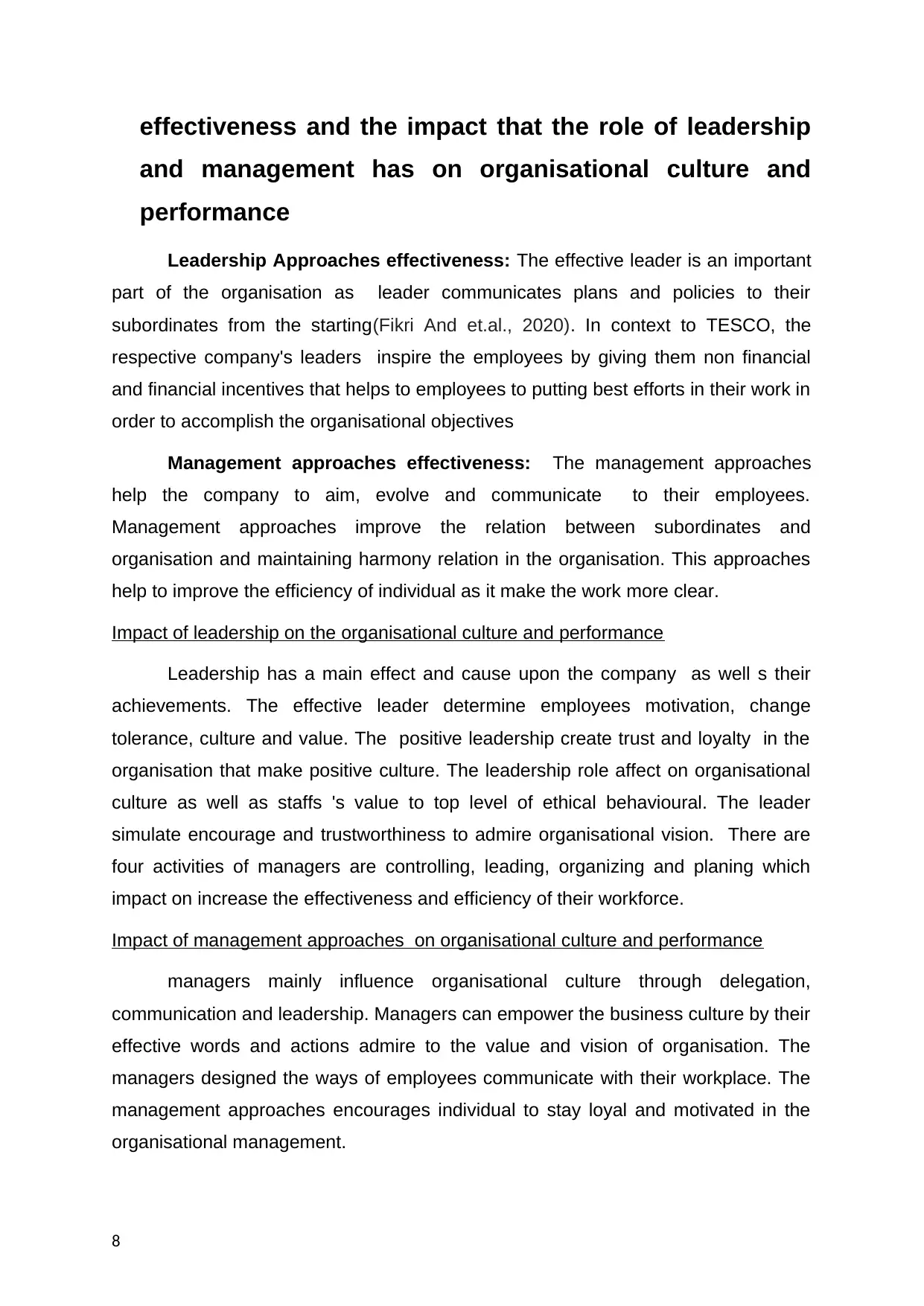
effectiveness and the impact that the role of leadership
and management has on organisational culture and
performance
Leadership Approaches effectiveness: The effective leader is an important
part of the organisation as leader communicates plans and policies to their
subordinates from the starting(Fikri And et.al., 2020). In context to TESCO, the
respective company's leaders inspire the employees by giving them non financial
and financial incentives that helps to employees to putting best efforts in their work in
order to accomplish the organisational objectives
Management approaches effectiveness: The management approaches
help the company to aim, evolve and communicate to their employees.
Management approaches improve the relation between subordinates and
organisation and maintaining harmony relation in the organisation. This approaches
help to improve the efficiency of individual as it make the work more clear.
Impact of leadership on the organisational culture and performance
Leadership has a main effect and cause upon the company as well s their
achievements. The effective leader determine employees motivation, change
tolerance, culture and value. The positive leadership create trust and loyalty in the
organisation that make positive culture. The leadership role affect on organisational
culture as well as staffs 's value to top level of ethical behavioural. The leader
simulate encourage and trustworthiness to admire organisational vision. There are
four activities of managers are controlling, leading, organizing and planing which
impact on increase the effectiveness and efficiency of their workforce.
Impact of management approaches on organisational culture and performance
managers mainly influence organisational culture through delegation,
communication and leadership. Managers can empower the business culture by their
effective words and actions admire to the value and vision of organisation. The
managers designed the ways of employees communicate with their workplace. The
management approaches encourages individual to stay loyal and motivated in the
organisational management.
8
and management has on organisational culture and
performance
Leadership Approaches effectiveness: The effective leader is an important
part of the organisation as leader communicates plans and policies to their
subordinates from the starting(Fikri And et.al., 2020). In context to TESCO, the
respective company's leaders inspire the employees by giving them non financial
and financial incentives that helps to employees to putting best efforts in their work in
order to accomplish the organisational objectives
Management approaches effectiveness: The management approaches
help the company to aim, evolve and communicate to their employees.
Management approaches improve the relation between subordinates and
organisation and maintaining harmony relation in the organisation. This approaches
help to improve the efficiency of individual as it make the work more clear.
Impact of leadership on the organisational culture and performance
Leadership has a main effect and cause upon the company as well s their
achievements. The effective leader determine employees motivation, change
tolerance, culture and value. The positive leadership create trust and loyalty in the
organisation that make positive culture. The leadership role affect on organisational
culture as well as staffs 's value to top level of ethical behavioural. The leader
simulate encourage and trustworthiness to admire organisational vision. There are
four activities of managers are controlling, leading, organizing and planing which
impact on increase the effectiveness and efficiency of their workforce.
Impact of management approaches on organisational culture and performance
managers mainly influence organisational culture through delegation,
communication and leadership. Managers can empower the business culture by their
effective words and actions admire to the value and vision of organisation. The
managers designed the ways of employees communicate with their workplace. The
management approaches encourages individual to stay loyal and motivated in the
organisational management.
8
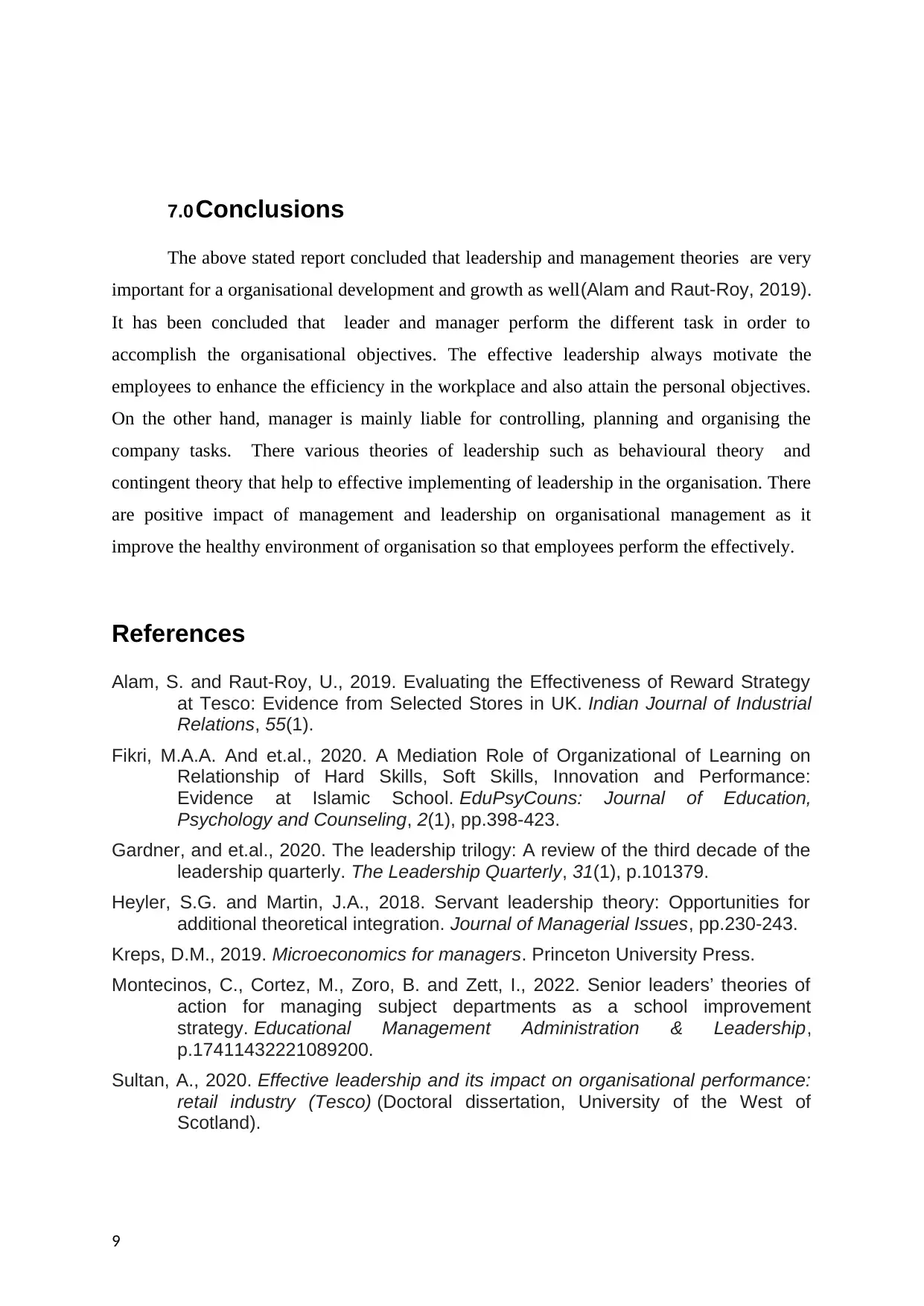
7.0 Conclusions
The above stated report concluded that leadership and management theories are very
important for a organisational development and growth as well(Alam and Raut-Roy, 2019).
It has been concluded that leader and manager perform the different task in order to
accomplish the organisational objectives. The effective leadership always motivate the
employees to enhance the efficiency in the workplace and also attain the personal objectives.
On the other hand, manager is mainly liable for controlling, planning and organising the
company tasks. There various theories of leadership such as behavioural theory and
contingent theory that help to effective implementing of leadership in the organisation. There
are positive impact of management and leadership on organisational management as it
improve the healthy environment of organisation so that employees perform the effectively.
References
Alam, S. and Raut-Roy, U., 2019. Evaluating the Effectiveness of Reward Strategy
at Tesco: Evidence from Selected Stores in UK. Indian Journal of Industrial
Relations, 55(1).
Fikri, M.A.A. And et.al., 2020. A Mediation Role of Organizational of Learning on
Relationship of Hard Skills, Soft Skills, Innovation and Performance:
Evidence at Islamic School. EduPsyCouns: Journal of Education,
Psychology and Counseling, 2(1), pp.398-423.
Gardner, and et.al., 2020. The leadership trilogy: A review of the third decade of the
leadership quarterly. The Leadership Quarterly, 31(1), p.101379.
Heyler, S.G. and Martin, J.A., 2018. Servant leadership theory: Opportunities for
additional theoretical integration. Journal of Managerial Issues, pp.230-243.
Kreps, D.M., 2019. Microeconomics for managers. Princeton University Press.
Montecinos, C., Cortez, M., Zoro, B. and Zett, I., 2022. Senior leaders’ theories of
action for managing subject departments as a school improvement
strategy. Educational Management Administration & Leadership,
p.17411432221089200.
Sultan, A., 2020. Effective leadership and its impact on organisational performance:
retail industry (Tesco) (Doctoral dissertation, University of the West of
Scotland).
9
The above stated report concluded that leadership and management theories are very
important for a organisational development and growth as well(Alam and Raut-Roy, 2019).
It has been concluded that leader and manager perform the different task in order to
accomplish the organisational objectives. The effective leadership always motivate the
employees to enhance the efficiency in the workplace and also attain the personal objectives.
On the other hand, manager is mainly liable for controlling, planning and organising the
company tasks. There various theories of leadership such as behavioural theory and
contingent theory that help to effective implementing of leadership in the organisation. There
are positive impact of management and leadership on organisational management as it
improve the healthy environment of organisation so that employees perform the effectively.
References
Alam, S. and Raut-Roy, U., 2019. Evaluating the Effectiveness of Reward Strategy
at Tesco: Evidence from Selected Stores in UK. Indian Journal of Industrial
Relations, 55(1).
Fikri, M.A.A. And et.al., 2020. A Mediation Role of Organizational of Learning on
Relationship of Hard Skills, Soft Skills, Innovation and Performance:
Evidence at Islamic School. EduPsyCouns: Journal of Education,
Psychology and Counseling, 2(1), pp.398-423.
Gardner, and et.al., 2020. The leadership trilogy: A review of the third decade of the
leadership quarterly. The Leadership Quarterly, 31(1), p.101379.
Heyler, S.G. and Martin, J.A., 2018. Servant leadership theory: Opportunities for
additional theoretical integration. Journal of Managerial Issues, pp.230-243.
Kreps, D.M., 2019. Microeconomics for managers. Princeton University Press.
Montecinos, C., Cortez, M., Zoro, B. and Zett, I., 2022. Senior leaders’ theories of
action for managing subject departments as a school improvement
strategy. Educational Management Administration & Leadership,
p.17411432221089200.
Sultan, A., 2020. Effective leadership and its impact on organisational performance:
retail industry (Tesco) (Doctoral dissertation, University of the West of
Scotland).
9
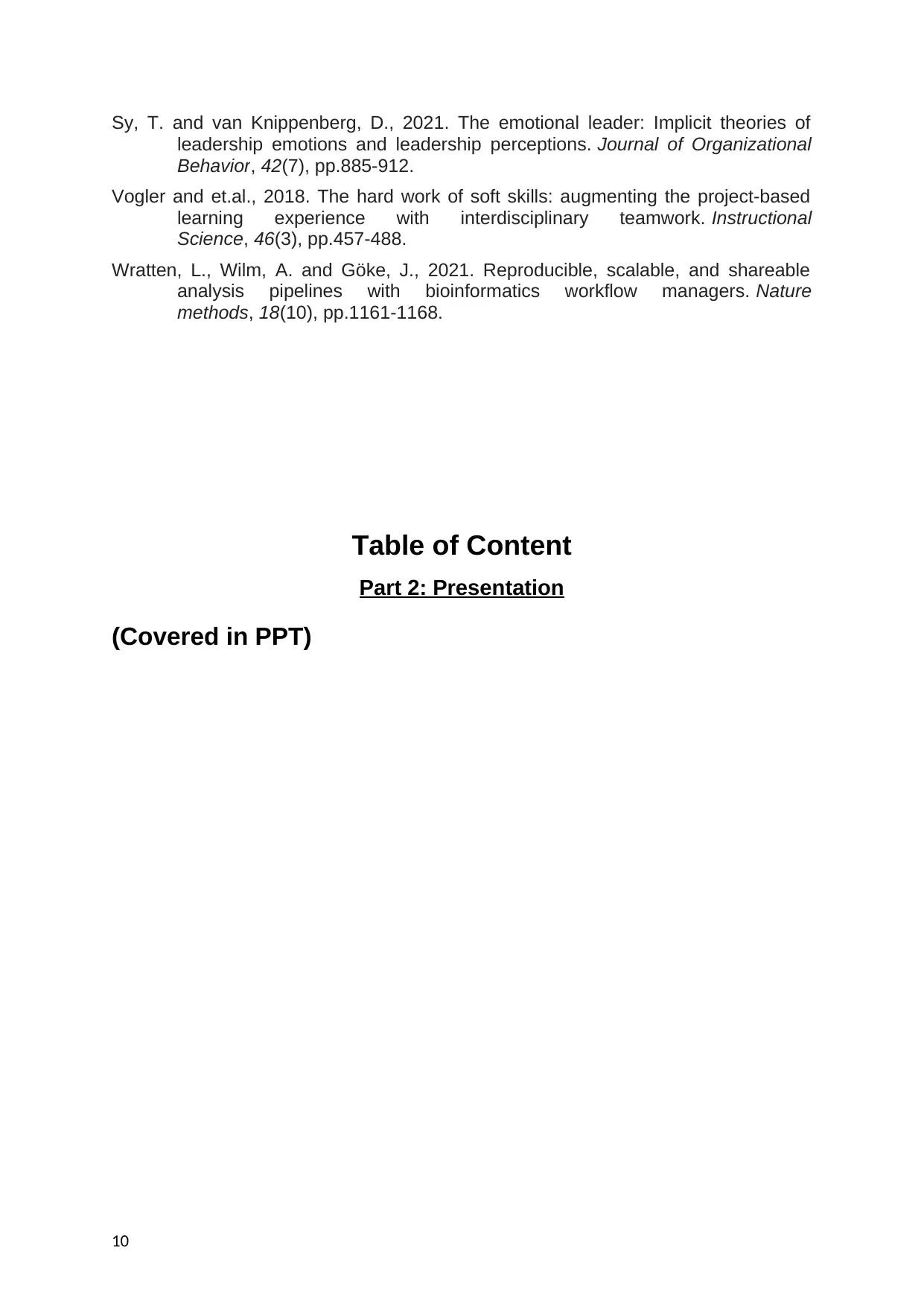
Sy, T. and van Knippenberg, D., 2021. The emotional leader: Implicit theories of
leadership emotions and leadership perceptions. Journal of Organizational
Behavior, 42(7), pp.885-912.
Vogler and et.al., 2018. The hard work of soft skills: augmenting the project-based
learning experience with interdisciplinary teamwork. Instructional
Science, 46(3), pp.457-488.
Wratten, L., Wilm, A. and Göke, J., 2021. Reproducible, scalable, and shareable
analysis pipelines with bioinformatics workflow managers. Nature
methods, 18(10), pp.1161-1168.
Table of Content
Part 2: Presentation
(Covered in PPT)
10
leadership emotions and leadership perceptions. Journal of Organizational
Behavior, 42(7), pp.885-912.
Vogler and et.al., 2018. The hard work of soft skills: augmenting the project-based
learning experience with interdisciplinary teamwork. Instructional
Science, 46(3), pp.457-488.
Wratten, L., Wilm, A. and Göke, J., 2021. Reproducible, scalable, and shareable
analysis pipelines with bioinformatics workflow managers. Nature
methods, 18(10), pp.1161-1168.
Table of Content
Part 2: Presentation
(Covered in PPT)
10
1 out of 10
Related Documents
Your All-in-One AI-Powered Toolkit for Academic Success.
+13062052269
info@desklib.com
Available 24*7 on WhatsApp / Email
![[object Object]](/_next/static/media/star-bottom.7253800d.svg)
Unlock your academic potential
© 2024 | Zucol Services PVT LTD | All rights reserved.

